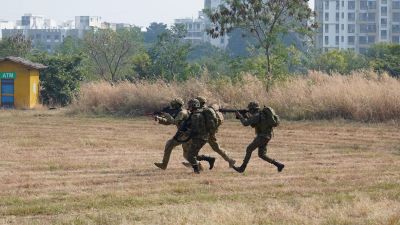He confessed, on videotape: Prosecution tells Madras HC
In sensational disclosure in the murder case against the Kanchi Shankaracharya, the Tamil Nadu police today told the Madras High Court that ...

In sensational disclosure in the murder case against the Kanchi Shankaracharya, the Tamil Nadu police today told the Madras High Court that they had videotaped his ‘‘confession’’ in their custody.
The police also alleged for the first time the Shankaracharya was closely associated with a woman called Usha in the conspiracy to murder his detractor Shankararaman.
The Shankaracharya’s counsel, I Subramanium, vehemently opposed the police offer to play the videotape of the alleged confession as he feared that it would only ‘‘prejudice’’ the case against his client.
The police counsel, K T S Tulsi, explained that they had videotaped the entire interrogation of Jayendra Saraswathi to avoid any allegations of ill-treatment during the three days he was in their custody.
The same strategy had helped them deflect the allegation that they had violated the Supreme Court guidelines while arresting him on November 10 in a town near Hyderabad.
If the court permits the videotape of his confession to be played, it will have a bearing only on the fate of the latest bail application filed by the Shankaracharya. It will not affect the trial as a confession made to the police is not admissible as evidence even when it is videotaped.
|
No comments: Mutt
|
|||||
|
Story continues below this ad |
|||||
But, subsequent to his confession in their custody, the police had the option of taking the Shankaracharya before a magistrate and recording his confession under Section 164 CrPC. But they could not have exercised that option unless he agreed to repeat his confession before the magistrate.
It is nevertheless significant that the police did not disclose the videotaped confession last week when they had unsuccessfully sought an extension of his remand in their custody.
In an apparent tit-for-tat, they made that disclosure only today to counter a fresh attempt by Jayendra Saraswathi to seek bail after one of the alleged killers, Kadiravan, retracted his judicial confession last week.
The police’s counsel, KTS Tulsi, alleged that the Shankaracharya, far from displaying the conduct of ‘‘an elevated soul,’’ was using ‘‘every trick in the book’’ to tamper with evidence even while he is behind bars.
In a 11-page affidavit, the police alleged that in the run-up to his retraction, Kadiravan had been visited by as many as eight lawyers in the jail in 48 hours. The police said that some of those eight listed lawyers had also appeared for the Shankaracharya in the case.
The disclosure about the woman accomplice was made to suggest that the Shankaracharya had taken recourse to the extreme step because the deceased was making allegations not only about the mutt but also about his ‘‘personal conduct .. which was unbecoming of an Acharya.’’
By way of example, the affidavit claimed that there was material to show that the Shankaracharya was ‘‘in the habit of talking to a deserted woman by name Usha at Sri Rangam during early morning hours. The conversation used to last even for 900 pulse units. She had been provided with free quarters to stay.
‘‘Substantial sums of money had been periodically transferred to her through Bank. She has withdrawn the entire money from her account and she is absconding. Therefore, the Petitioner had every reason to believe that his misconduct would be exposed by the deceased Shankararaman.
‘‘Apart from the above, her involvement in the conspiracy and other allied matters are being probed since the Petitioner was regularly speaking to her before and after the incident, apart from transmission of funds. The extent of her involvement in the crime also has to be probed further in the light of materials available.’’
The affidavit further said that in the course of ‘‘his mission of exposure,’’ Shankararaman had raised questions about the ‘‘presence of women in the Mutt after 10 pm,’’ extravagant life led by the relatives of the pontiff.
According to the affidavit, Shankararaman went on protesting that the Mutt indulged in various kinds of activities and had drifted away from the path of holy peetathipathis and, in particular, had taken a diffrent path from that of the earlier pontiff.





- 01
- 02
- 03
- 04
- 05


























